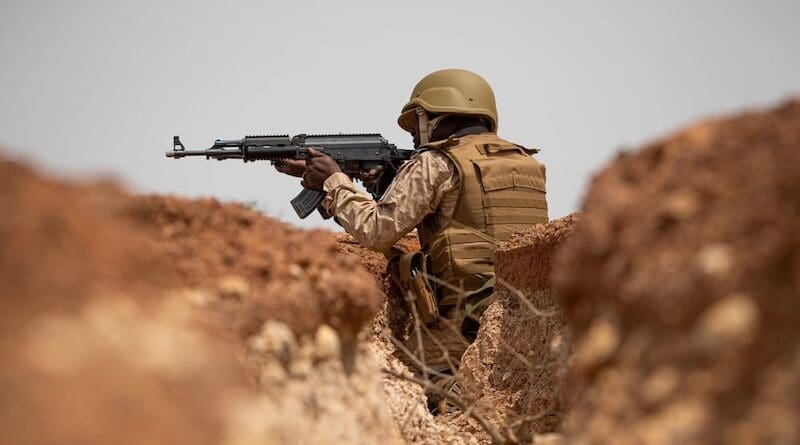Burkina Faso’s Volunteer Militia Implicated In ‘Systematic Extermination’
Graphic videos of a massacre in villages surrounding the western Burkina Faso town of Solenzo spread rapidly on social media in March. Dozens of lifeless bodies — most of them women, children and elderly — were scattered on the ground with their heads covered, their hands and feet bound.
Armed with assault rifles and blood-stained bladed weapons, the perpetrators wore uniforms and T-shirts that identified them as a mix of Burkinabe security forces, local self-defense groups and the government-backed militia known as the Volunteers for the Defense of the Homeland (VDP). Many took photos and videos on smartphones as they walked among the bodies.
“Entire families of Fulani shepherds were killed in the bushes of Solenzo, in the Bema and Ban areas,” a local told Agence France-Presse on condition of anonymity. “It happened between March 10 and 11. Members of this community who had lived in Solenzo for decades were massacred by VDPs and the defense and security forces.”
Witness and survivor testimonies and at least 11 videos posted on social media platforms detailed executions, burnt corpses, mass graves and homes burned to the ground. Burkina Faso’s ruling military junta denied the reports and called the videos fake.
According to the Burkinabe Democrats Panel, a civil rights group, the massacre targeted the Fulani people, a primarily West African ethnic group that is known for seminomadic herding. The Fulani have long been accused of supporting the violent extremist insurgent groups that have spread throughout the region.
“We have seen this before,” acting panel president Aboubacar Tall told security analyst Zagazola Makama. “This is a continuation of the systematic extermination of civilians under the guise of counterterrorism.”
The massacre fits a pattern of revenge attacks by insurgents, security forces and the VDP. In fact, al-Qaida affiliate Jama’at Nusrat al-Islam wal-Muslimin (JNIM) responded with a wave of retaliatory attacks, including a major assault on March 28 against a base in Diapaga.
JNIM reportedly killed 30 soldiers and 20 members of the VDP and captured three military vehicles, 13 motorcycles, and hundreds of weapons and boxes of ammunition. In an April 8 video claiming the attack, a JNIM leader called Diapaga “the beginning of revenge for Solenzo.”
These latest spasms of violence have reignited a Burkinabe debate on the ethnic makeup of VDP militias and whether they are predisposed to violence against rival groups, regardless of whether they are aligned with terrorists.
“Often composed of ill-disciplined and poorly trained men with a strong desire for revenge, the VDP has massively exacerbated cycles of ethnic conflict by systematically targeting communities it believes are complicit in extremist violence and activity,” analyst Charlie Werb wrote in a March 28 post for The African Insight.
“The violence committed against [the Fulani] by state forces has pushed more members of the community seeking revenge or protection into the arms of terrorist groups, while others decide to live or cooperate with extremists due to a lack of better alternatives.”
In detailing the Solenzo massacre, nongovernmental organization Human Rights Watch (HRW) spoke with an ethnic Fulani man who fled the Solenzo area more than a year ago.
“Every jihadist attack comes with a reprisal,” he said. “Being a Fulani today is synonymous with being a terrorist. … My family members are still around Bèna [16 kilometers from Solenzo], and I fear some of them might have been attacked, too.”
HRW senior Sahel researcher Ilaria Allegrozzi said the Solenzo massacre underscores a lack of accountability for the VDP and other government-aligned militias.
“As the armed conflict in Burkina Faso enters its ninth year, security forces and their allied militias and Islamist armed groups are committing serious crimes against an exhausted population without fear of consequence,” she said in a March 14 statement. “A concerted response by the authorities to the information implicating the militias in Solenzo would send a message that the government takes ending impunity seriously.”

